初三英语重点短语、句型总结
- 格式:pdf
- 大小:204.91 KB
- 文档页数:17
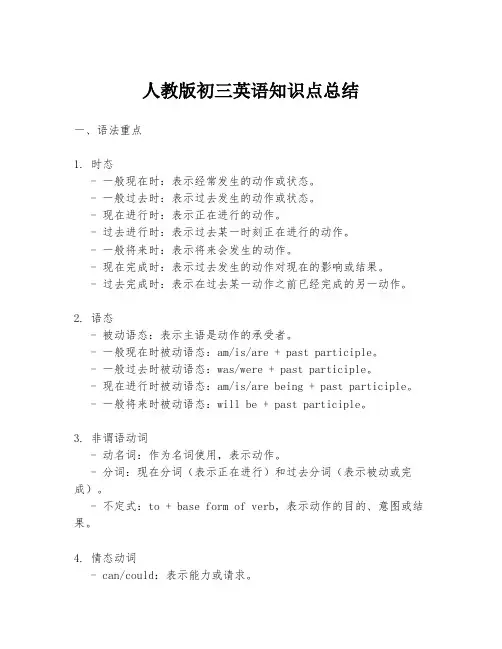
人教版初三英语知识点总结一、语法重点1. 时态- 一般现在时:表示经常发生的动作或状态。
- 一般过去时:表示过去发生的动作或状态。
- 现在进行时:表示正在进行的动作。
- 过去进行时:表示过去某一时刻正在进行的动作。
- 一般将来时:表示将来会发生的动作。
- 现在完成时:表示过去发生的动作对现在的影响或结果。
- 过去完成时:表示在过去某一动作之前已经完成的另一动作。
2. 语态- 被动语态:表示主语是动作的承受者。
- 一般现在时被动语态:am/is/are + past participle。
- 一般过去时被动语态:was/were + past participle。
- 现在进行时被动语态:am/is/are being + past participle。
- 一般将来时被动语态:will be + past participle。
3. 非谓语动词- 动名词:作为名词使用,表示动作。
- 分词:现在分词(表示正在进行)和过去分词(表示被动或完成)。
- 不定式:to + base form of verb,表示动作的目的、意图或结果。
4. 情态动词- can/could:表示能力或请求。
- may/might:表示可能性。
- must:表示必须或强烈义务。
- should/ought to:表示建议或应当。
5. 句子结构- 简单句:一个主语和一个谓语。
- 并列句:使用并列连词连接两个或多个简单句。
- 复合句:包含一个主句和至少一个从句。
- 定语从句:修饰名词或代词的从句。
- 状语从句:表示时间、地点、原因、条件、结果等。
二、词汇与短语1. 常见词汇- 描述人物特征的形容词:kind, honest, creative, etc.- 描述日常活动的动词短语:clean up, take out, turn off, etc.- 描述情感和情绪的名词:happiness, sadness, anger, etc. - 描述天气的词汇:sunny, rainy, windy, etc.2. 短语搭配- 动词短语搭配:finish doing, stop to do, remember to do, etc.- 形容词与介词的搭配:afraid of, interested in, good at, etc.- 常用口语表达:What's up?, How about…?, It's up to you, etc.三、阅读理解技巧1. 快速阅读(Skimming)- 快速浏览文章,抓住主旨大意。
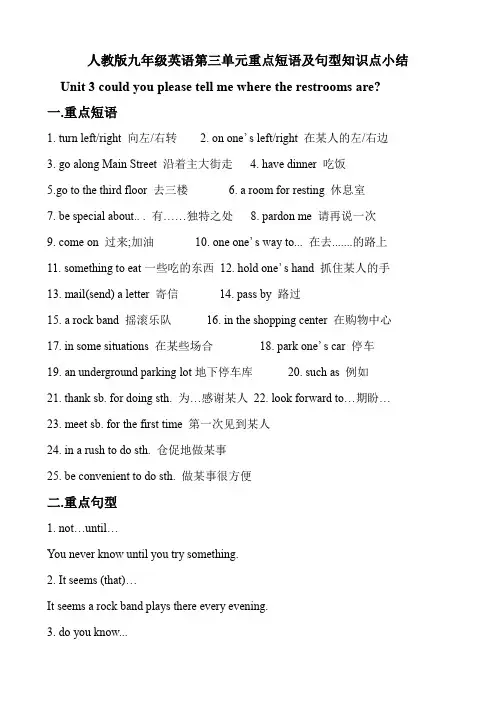
人教版九年级英语第三单元重点短语及句型知识点小结Unit 3 could you please tell me where the restrooms are?一.重点短语1. turn left/right 向左/右转2. on one’ s left/right 在某人的左/右边3. go along Main Street 沿着主大街走4. have dinner 吃饭5.go to the third floor 去三楼6. a room for resting 休息室7. be special about.. . 有……独特之处8. pardon me 请再说一次9. come on 过来;加油10. one one’ s way to... 在去.......的路上11. something to eat一些吃的东西12. hold one’ s hand 抓住某人的手13. mail(send) a letter 寄信14. pass by 路过15. a rock band 摇滚乐队16. in the shopping center 在购物中心17. in some situations 在某些场合18. park one’ s car 停车19. an underground parking lot地下停车库20. such as 例如21. thank sb. for doing sth. 为…感谢某人22. look forward to…期盼…23. meet sb. for the first time 第一次见到某人24. in a rush to do sth. 仓促地做某事25. be convenient to do sth. 做某事很方便二.重点句型1. not…until…You never know until you try something.2. It seems (that)…It seems a rock band plays there every evening.3. do you know...例:Excuse me, do you know where I can buy some medicine?Do you know when the bookstore closes today?4. Could you please tell me... ?Could you please tell me how to get to the post office?5.sb. suggest+ 从句(虚拟语气:should+V )例:The clerk suggests they go to the museum.6.take的用法① take some food take some medicine (=have吃,喝)① take notes做笔记① take one’s temperature ( 测量)① It takes sb some time/money to do something (花费,需要)① I’ll take this coat.(=buy购买)① take somebody / something to (带领,拿去,取)①take a train to Chongqing (乘坐)① take off(脱下)2.turn 的用法turn to page 80 翻到It is your turn.轮到你了。
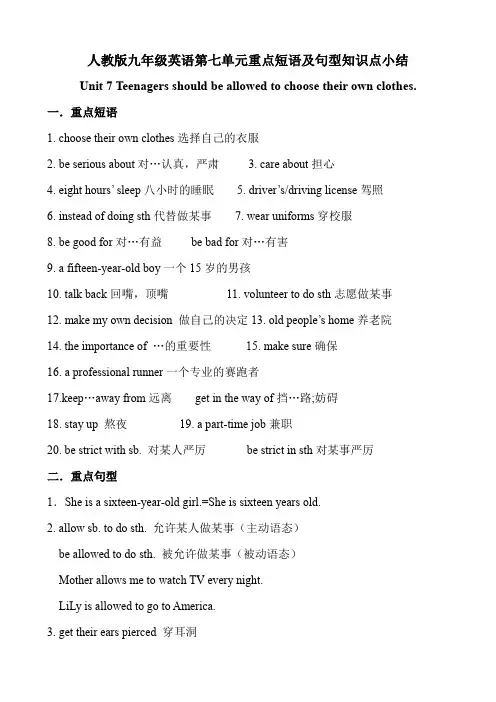
人教版九年级英语第七单元重点短语及句型知识点小结Unit 7 Teenagers should be allowed to choose their own clothes.一.重点短语1. choose their own clothes选择自己的衣服2. be serious about对…认真,严肃3. care about担心4. eight hours’ sleep八小时的睡眠5. driver’s/driving license驾照6. instead of doing sth代替做某事7. wear uniforms穿校服8. be good for对…有益be bad for对…有害9. a fifteen-year-old boy一个15岁的男孩10. talk back回嘴,顶嘴11. volunteer to do sth志愿做某事12. make my own decision 做自己的决定13. old people’s home养老院14. the importance of …的重要性15. make sure确保16. a professional runner一个专业的赛跑者17.keep…away from远离get in the way of挡…路;妨碍18. stay up 熬夜19. a part-time job兼职20. be strict with sb. 对某人严厉be strict in sth对某事严厉二.重点句型1.She is a sixteen-year-old girl.=She is sixteen years old.2. allow sb. to do sth. 允许某人做某事(主动语态)be allowed to do sth. 被允许做某事(被动语态)Mother allows me to watch TV every night.LiLy is allowed to go to America.3. get their ears pierced 穿耳洞让/使(别人)做某事get sth. done(过去分词)have sth. doneI get my hair cut. == I have my hair cut.4. enough 足够形容词+enough 如:beautiful enough足够漂亮enough+名词如:enough food 足够食物enough…to 足够…去做…例:I have enough money to go to Beijing. 我有足够的钱去北京。
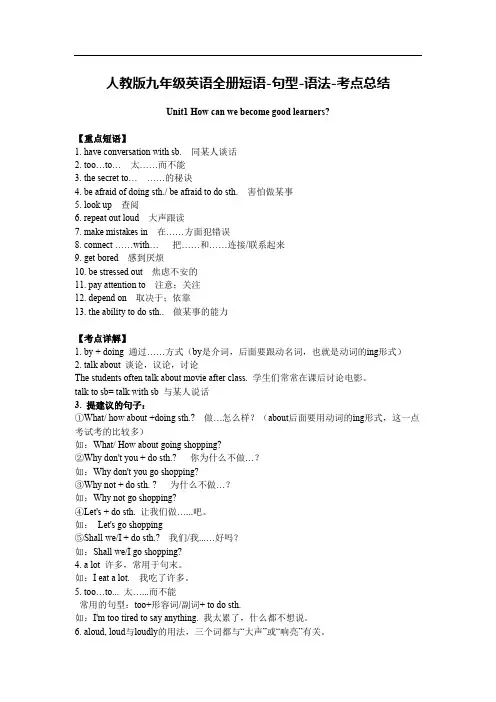
人教版九年级英语全册短语-句型-语法-考点总结Unit1 How can we become good learners?【重点短语】1. have conversation with sb. 同某人谈话2. too…to… 太……而不能3. the secret to… ……的秘诀4. be afraid of doing sth./ be afraid to do sth. 害怕做某事5. look up 查阅6. repeat out loud 大声跟读7. make mistakes in 在……方面犯错误8. connect ……with… 把……和……连接/联系起来9. get bored 感到厌烦10. be stressed out 焦虑不安的11. pay attention to 注意;关注12. depend on 取决于;依靠13. the ability to do sth.. 做某事的能力【考点详解】1. by + doing 通过……方式(by是介词,后面要跟动名词,也就是动词的ing形式)2. talk about 谈论,议论,讨论The students often talk about movie after class. 学生们常常在课后讨论电影。
talk to sb= talk with sb 与某人说话3. 提建议的句子:①What/ how about +doing sth.? 做…怎么样?(about后面要用动词的ing形式,这一点考试考的比较多)如:What/ How about going shopping?②Why don't you + do sth.? 你为什么不做…?如:Why don't you go shopping?③Why not + do sth. ? 为什么不做…?如:Why not go shopping?④Let's + do sth. 让我们做…...吧。
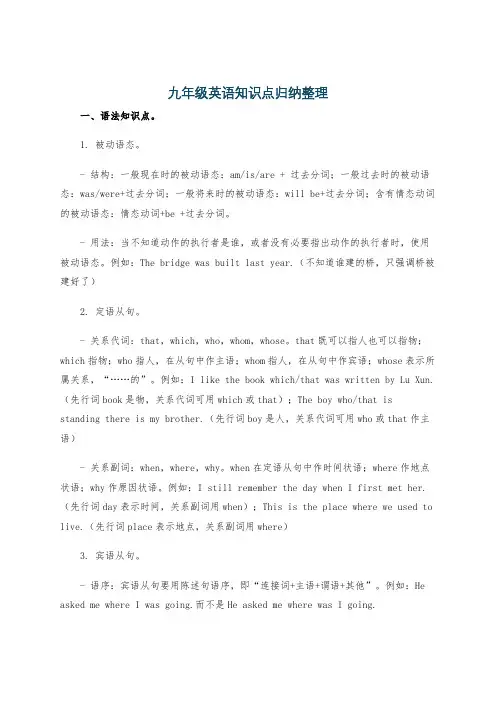
九年级英语知识点归纳整理一、语法知识点。
1. 被动语态。
- 结构:一般现在时的被动语态:am/is/are + 过去分词;一般过去时的被动语态:was/were+过去分词;一般将来时的被动语态:will be+过去分词;含有情态动词的被动语态:情态动词+be +过去分词。
- 用法:当不知道动作的执行者是谁,或者没有必要指出动作的执行者时,使用被动语态。
例如:The bridge was built last year.(不知道谁建的桥,只强调桥被建好了)2. 定语从句。
- 关系代词:that,which,who,whom,whose。
that既可以指人也可以指物;which指物;who指人,在从句中作主语;whom指人,在从句中作宾语;whose表示所属关系,“……的”。
例如:I like the book which/that was written by Lu Xun.(先行词book是物,关系代词可用which或that);The boy who/that is standing there is my brother.(先行词boy是人,关系代词可用who或that作主语)- 关系副词:when,where,why。
when在定语从句中作时间状语;where作地点状语;why作原因状语。
例如:I still remember the day when I first met her.(先行词day表示时间,关系副词用when);This is the place where we used to live.(先行词place表示地点,关系副词用where)3. 宾语从句。
- 语序:宾语从句要用陈述句语序,即“连接词+主语+谓语+其他”。
例如:He asked me where I was going.而不是He asked me where was I going.- 连接词:that(无意义,可省略,在从句中不作成分);if/whether(“是否”,在从句中不作成分);特殊疑问词(如what,when,where,why,how等,在从句中作相应的成分)。
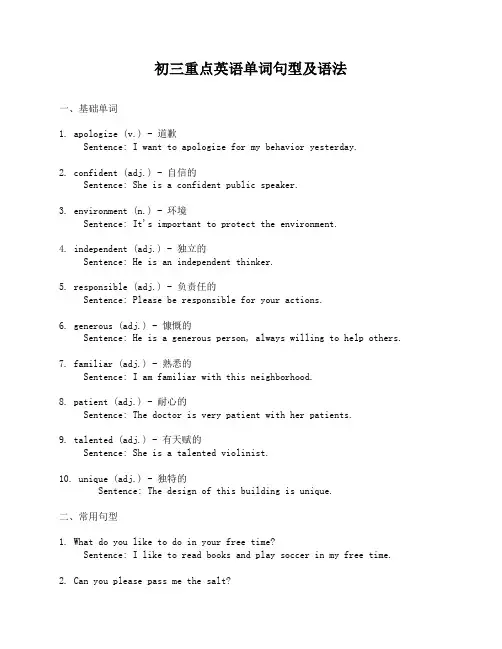
初三重点英语单词句型及语法一、基础单词1. apologize (v.) - 道歉Sentence: I want to apologize for my behavior yesterday.2. confident (adj.) - 自信的Sentence: She is a confident public speaker.3. environment (n.) - 环境Sentence: It's important to protect the environment.4. independent (adj.) - 独立的Sentence: He is an independent thinker.5. responsible (adj.) - 负责任的Sentence: Please be responsible for your actions.6. generous (adj.) - 慷慨的Sentence: He is a generous person, always willing to help others.7. familiar (adj.) - 熟悉的Sentence: I am familiar with this neighborhood.8. patient (adj.) - 耐心的Sentence: The doctor is very patient with her patients.9. talented (adj.) - 有天赋的Sentence: She is a talented violinist.10. unique (adj.) - 独特的Sentence: The design of this building is unique.二、常用句型1. What do you like to do in your free time?Sentence: I like to read books and play soccer in my free time.2. Can you please pass me the salt?Sentence: Sure, here you go.3. I'm sorry, but I can't attend the party tonight.Sentence: That's okay, maybe next time.4. How was your weekend?Sentence: My weekend was great, I went hiking with my family.5. Could you please help me with my homework?Sentence: Of course, I would be happy to help.6. What time does the movie start?Sentence: The movie starts at 7:30 PM.7. Where is the nearest bus stop?Sentence: The nearest bus stop is just around the corner.8. I'm really excited about the school trip next week.Sentence: Me too, it's going to be a lot of fun.9. What do you want to be when you grow up?Sentence: I want to be a doctor and help people.10. How do you spell your name?Sentence: My name is spelled J-O-H-N.三、语法1. Present Simple Tense (一般现在时)- 表示经常发生的动作或事实。
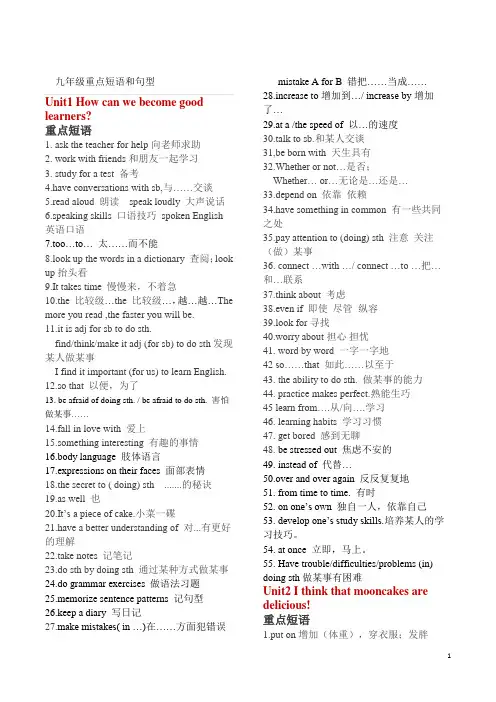
九年级重点短语和句型Unit1 How can we become good learners?重点短语1. ask the teacher for help 向老师求助2. work with friends 和朋友一起学习3. study for a test 备考4.have conversations with sb,与……交谈5.read aloud 朗读speak loudly 大声说话6.speaking skills 口语技巧spoken English英语口语7.too…to… 太……而不能8.look up the words in a dictionary 查阅;look up抬头看9.It takes time 慢慢来,不着急10.the 比较级…the 比较级…,越…越…The more you read ,the faster you will be.11.it is adj for sb to do sth.find/think/make it adj (for sb) to do sth发现某人做某事I find it important (for us) to learn English.12.so that 以便,为了13. be afraid of doing sth. / be afraid to do sth. 害怕做某事……14.fall in love with 爱上15.something interesting 有趣的事情16.body language 肢体语言17.expressions on their faces 面部表情18.the secret to ( doing) sth .......的秘诀19.as well 也20.It’s a piece of cake.小菜一碟21.have a better understanding of 对...有更好的理解22.take notes 记笔记23.do sth by doing sth 通过某种方式做某事24.do grammar exercises 做语法习题25.memorize sentence patterns 记句型26.keep a diary 写日记27.make mistakes( in …)在……方面犯错误mistake A for B 错把……当成……28.increase to增加到…/ increase by增加了…29.at a /the speed of 以…的速度30.talk to sb.和某人交谈31,be born with 天生具有32.Whether or not…是否;Whether… or…无论是…还是…33.depend on 依靠依赖34.have something in common 有一些共同之处35.pay attention to (doing) sth 注意关注(做)某事36. connect …with …/ connect …to …把…和…联系37.think about 考虑38.even if 即使尽管纵容39.look for 寻找40.worry about 担心担忧41.word by word 一字一字地42so……that 如此……以至于43.the ability to do sth. 做某事的能力44. practice makes perfect.熟能生巧45 learn from….从/向….学习46.learning habits 学习习惯47.get bored 感到无聊48. be stressed out 焦虑不安的49. instead of 代替…50.over and over again 反反复复地51. from time to time. 有时52. on one’s own 独自一人,依靠自己53. develop one’s study skills.培养某人的学习技巧。
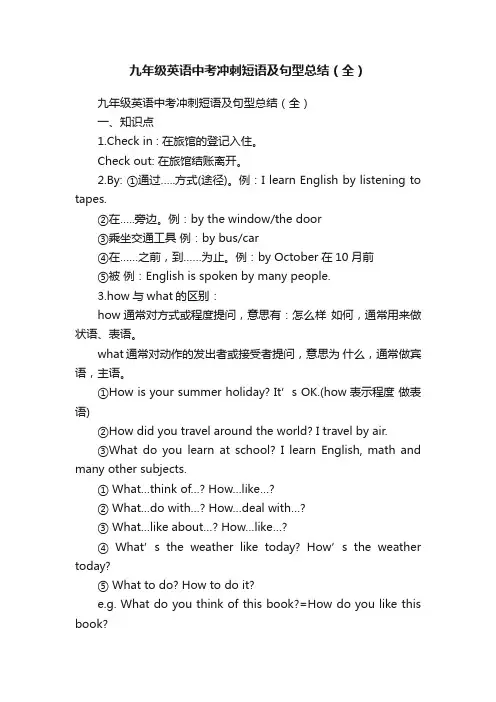
九年级英语中考冲刺短语及句型总结(全)九年级英语中考冲刺短语及句型总结(全)一、知识点1.Check in : 在旅馆的登记入住。
Check out: 在旅馆结账离开。
2.By: ①通过…..方式(途径)。
例:I learn English by listening to tapes.②在…..旁边。
例:by the window/the door③乘坐交通工具例:by bus/car④在……之前,到……为止。
例:by October在10月前⑤被例:English is spoken by many people.3.how与what的区别:how通常对方式或程度提问,意思有:怎么样如何,通常用来做状语、表语。
what通常对动作的发出者或接受者提问,意思为什么,通常做宾语,主语。
①How is your summer holiday? It’s OK.(how表示程度做表语)②How did you travel around the world? I travel by air.③What do you learn at school? I learn English, math and many other subjects.① What…think of…? How…like…?② What…do with…? How…deal with…?③ What…like about…? How…like…?④ What’s the weather like today? How’s the weather today?⑤ What to do? How to do it?e.g. What do you think of this book?=How do you like this book?I don’t know what I should do with the matter.=I don’t know how I should deal with it.What do you like about China?=How do you like China?I don’t know what to do next step?=I don’t know how to do it next step?㊣ What good / bad weather it is today!(weather为不可数名词,其前不能加 a )㊣ What a fine / bad day it is today! (day为可数名词,其前要加 a )4. aloud, loud与loudly的用法: 三个词都与"大声"或"响亮"有关。
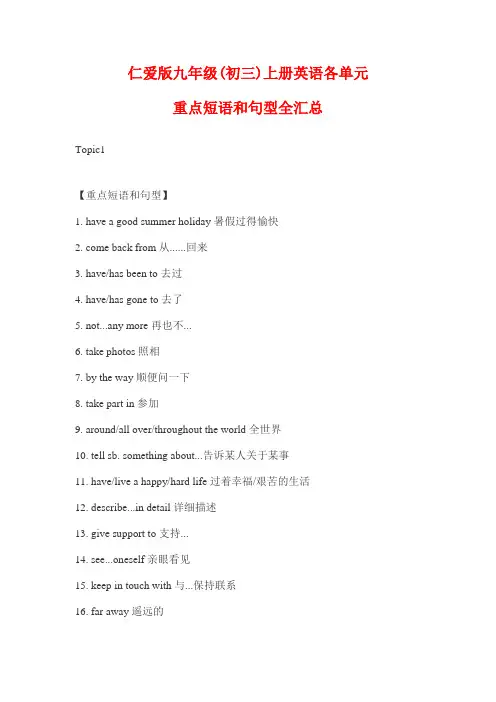
仁爱版九年级(初三)上册英语各单元重点短语和句型全汇总Topic1【重点短语和句型】1. have a good summer holiday暑假过得愉快2. come back from从......回来3. have/has been to 去过4. have/has gone to去了5. not...any more 再也不...6. take photos 照相7. by the way 顺便问一下8. take part in 参加9. around/all over/throughout the world 全世界10. tell sb. something about...告诉某人关于某事11. have/live a happy/hard life 过着幸福/艰苦的生活12. describe...in detail 详细描述13. give support to支持...14. see...oneself亲眼看见15. keep in touch with 与...保持联系16. far away 遥远的17. kinds/sorts of 各种各样的...18. not only...but also 不仅...而且...19. make progress 取得进步20. more than/over 多于21. develop/improve rapidly 迅速发展/改善22. tell sb. (not ) to do sth. 告诉某人(别)做某事23. ask sb. (not ) to do sth. 要求某人(别)做某事24. in order to do sth. 为了做某事25. have to do sth. 不得不做某事26. It's +形容词+for sb. to do sth. 对于某人来说做某事是...的27. why not do sth. 为什么不做某事28. succeed/be successful in doing sth. 成功地做某事29. dream about doing sth. 梦想做某事30. see/hear sb. do/doing sth. 看见/听见某人做/正在做某事Topic2【重点短语和句型】1. get lost 迷路2. a couple of 一些,几个3. with the development of 随着...的发展4. with the help of... 在...的帮助下5. one of the+形容词最高级+名词复数其中之一/最...的其中之一6. each other 互相7. call/ring sb.up 给某人打电话8. at least 至少9. sth. happen to sb. 某人发生某事10. What happened to sb? 某人发生某事?11. take place 发生12. because of 因为,由于13. be strict with sb./in sth. 对某人/某事严格要求14. carry out 执行15. thousands/millions/hundreds of 成千上万/无数的/成百上千...16. two thousand/million/hundred 两千/百万/百(具体数字后面不加s)17. half of...一半...18. two thirds 三分之二19. be short of 短缺...20. so far 到目前为止21. be known/famous for 因...而闻名22. be known/famous as 作为...而闻名23. thanks to 幸亏...24. have a long way to go 有很长的路要走25. a town called... 一个叫做...的镇26. fewer than/less than 少于27. places of interest 名胜古迹28. be interested in 对...感兴趣29. such as 例如...30. look/smell/sound/feel/taste+形容词看/闻/听/摸/尝起来...31. such a/an+形容词+sb./sth 如此...的人/物32. take sb. to sp 带某人去某地33. keep up with 赶上34. have fun doing sth. 做某事很愉快35. have a population of...有...的人口36. What's the population of...? ...有多少人口?37. want to do sth. 想要做某事38. hate to do sth 讨厌做某事39. take measures to do sth. 采取措施做某事40. have(no)chance/time to do sth. 有机会/时间做某事41. used to do sth. 过去常常做某事42. be used to do sth. 被用来做某事43. be/get used to doing sth. 习惯做某事44. work well in doing sth. 在...方面起到显著作用Topic1【重点短语】1. chemical factory 化工厂2. pour… into… 把……排放到……3. in a bad mood 处在不好的情绪中4. manage to do sth. 设法去做某事5. do harm to …/ be harmful to… 对……有害6. quite a few 相当多7. no better than 同…….一样差8. in pubic 公开地9. all sorts of 各种各样的10.in many ways 在许多方面【重点句型】1. Look, there are several chemical factories pouring waste water into the streams.看,有几家化工厂正往河里排放废水。
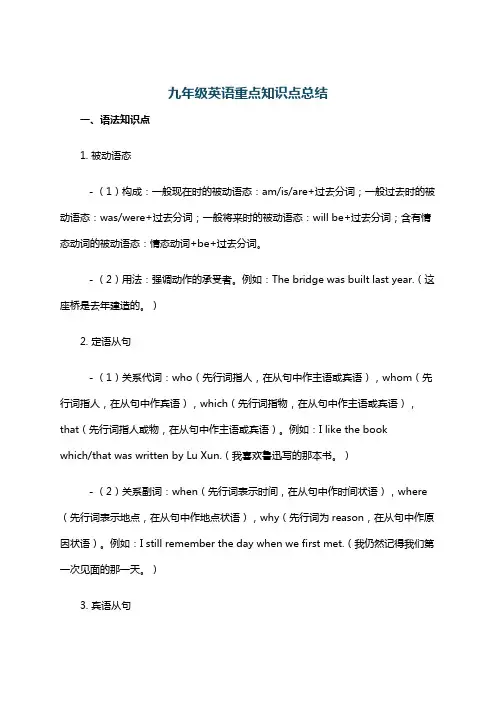
九年级英语重点知识点总结一、语法知识点1. 被动语态- (1)构成:一般现在时的被动语态:am/is/are+过去分词;一般过去时的被动语态:was/were+过去分词;一般将来时的被动语态:will be+过去分词;含有情态动词的被动语态:情态动词+be+过去分词。
- (2)用法:强调动作的承受者。
例如:The bridge was built last year.(这座桥是去年建造的。
)2. 定语从句- (1)关系代词:who(先行词指人,在从句中作主语或宾语),whom(先行词指人,在从句中作宾语),which(先行词指物,在从句中作主语或宾语),that(先行词指人或物,在从句中作主语或宾语)。
例如:I like the bookwhich/that was written by Lu Xun.(我喜欢鲁迅写的那本书。
)- (2)关系副词:when(先行词表示时间,在从句中作时间状语),where (先行词表示地点,在从句中作地点状语),why(先行词为reason,在从句中作原因状语)。
例如:I still remember the day when we first met.(我仍然记得我们第一次见面的那一天。
)3. 宾语从句- (1)语序:宾语从句要用陈述句语序。
例如:He asked me where I was from.(他问我来自哪里。
)- (2)时态:主现从不限;主过从必过;客观真理用一般现在时。
例如:She says that she will go to Beijing tomorrow.(她说她明天将去北京。
);He said that he had seen the movie.(他说他已经看过这部电影了。
);The teacher told us that the earth goes around the sun.(老师告诉我们地球绕着太阳转。
)4. 情态动词- (1)must:表示必须,肯定推测(用于肯定句,意为“一定”)。
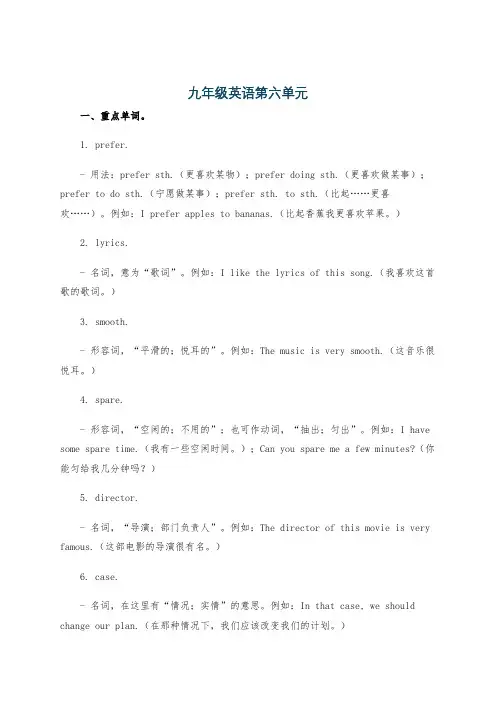
九年级英语第六单元一、重点单词。
1. prefer.- 用法:prefer sth.(更喜欢某物);prefer doing sth.(更喜欢做某事);prefer to do sth.(宁愿做某事);prefer sth. to sth.(比起……更喜欢……)。
例如:I prefer apples to bananas.(比起香蕉我更喜欢苹果。
)2. lyrics.- 名词,意为“歌词”。
例如:I like the lyrics of this song.(我喜欢这首歌的歌词。
)3. smooth.- 形容词,“平滑的;悦耳的”。
例如:The music is very smooth.(这音乐很悦耳。
)4. spare.- 形容词,“空闲的;不用的”;也可作动词,“抽出;匀出”。
例如:I have some spare time.(我有一些空闲时间。
);Can you spare me a few minutes?(你能匀给我几分钟吗?)5. director.- 名词,“导演;部门负责人”。
例如:The director of this movie is very famous.(这部电影的导演很有名。
)6. case.- 名词,在这里有“情况;实情”的意思。
例如:In that case, we should change our plan.(在那种情况下,我们应该改变我们的计划。
)7. war.- 名词,“战争;战争状态”。
例如:The two countries were at war.(这两个国家处于战争状态。
)8. stick.- 动词,“粘贴;将……刺入”,过去式和过去分词是stuck。
例如:Stick the picture on the wall.(把这幅画贴在墙上。
)9. down.- 形容词,“悲哀;沮丧”。
例如:He looks a bit down today.(他今天看起来有点沮丧。
Unit1 How can we become good learners?一.重点短语1. ask sb. for help 请求某人的帮忙be patient 耐心点儿2.improve one’ s speaking skills 提髙某人说的能力3. spoken English=oral English英语口语4. make word cards 制作单词卡片5. listen to tapes 听磁带6. the secret to language learning 语言学习的窍门7. be afraid to do sth.不敢'做某事8. fall in love with.. . 爱上9. body language 肢体语言10. take notes 记笔记make mistakes in grammar 犯语法错误learning habits 学习习惯13. have sth. in common 有...一路点14. pay attention to 注意15. connect…with…把....与....联系起来16. write down key words 摘抄重点词17. in class 在课堂上after class 课后18. be interested in… 对.......感兴趣19. do sth. on one’s own 独立做某事20. worry about 为...而担忧21. depend on=rely on 依赖;取决于二.重点句型1. What about doing sth ? 例:What about listening to tapes?2. by的用法a. 介词prep. (指交通等)乘;例:The man came by bus. 那人是坐公共汽车来的。
They went to Shanghai by plane. 他们坐飞机去上海。
前李朱指导学校初三英语专项初中英语要点短语、句型汇总[短语、词组概括]由动词开头构成的短语、词组好多。
复习时应分类办理:一、动词+介词.lookat看,looklike看上去像,lookafter照顾.listento听.welcometo欢迎到.sayhelloto向问好.speakto对说话此类短语相当于及物动词,后来一定带宾语,但宾语不论是名词仍是代词,都要放在介词以后。
二、动词+副词“动词+副词”所构成的短语义分为两类:A.动词(vt.)+副词1.puton 穿上2.takeoff 脱下3.writedown 记下此类短语能够带宾语,宾语若是名词,放在副词前后皆可;宾语若是人称代词,只好放在副词的前方。
B.动词(vi)+副词。
1.comeon赶忙2.getup 起床3.gohome回家4.comein进来5.sitdown 坐下6.standup 起立此类短语属于不及物动词,不可以够带宾语。
三、其余类动词词组thedoorthesametowork/classillalook/seatsupperyoungshoppingTV/gamesplaygames[介词短语聚焦]“介词+名词/代词”所构成的短语称为介词短语。
现将Unitsl-16常用的介词短语按用法进行归类。
1.in+语言/颜色/衣帽等,表示使用某种语言或衣着。
2.in+Row/Team/Class/Grade等,表示“在排/队/班级/年级”等。
3.inthemorning/afternoon/evening/表示“在上午/下午/夜晚”等一段时间。
4.inthedesk/pencil-box/bedroom等表示“在书桌/铅笔盒/寝室里”。
5.inthetree表示“在树上(非树自己全部)”;onthetree表示“在树上(为树自己全部)”。
6.inthewall表示“在墙上(凹陷进去)”;onthewall表示“在墙上(指墙的1前李朱指导学校初三英语专项表面)”。
Unit 4一、知识点1. if 引导的非真实性条件状语从句即虚拟语气通过动词形式的变化来表示说话人对发生的动作或存在的状态,所持的态度或看法的动词形式称为语气,虚拟语气表示说话人所说的话不是事实,而是一种祝愿,建议或是与事实相反的假设等。
If 引导的条件状语从句分为真实和非真实条件句,非真实条件句应用虚拟语气。
如果要表示与现在或将来事实相反时,其虚拟语气结构为:即:(从句)if +主语+动词过去式(be 动词用were), (主句) 主语+would+动词原形如:If I had time, I would go for a walk.如果我有时间,我就会去散步。
(事实上我现在没有时间)If I were you, I would take an umbrella. 假如我是你的话,我会带上雨伞。
(事实上我不是你)I would say no if someone asked me to be in a movie.假如有人请我当电影演员,我会表示拒绝。
(事实上瑞没有人请我当电影演员)2. pretend to do sth. 假装做某事 I pretended to sleep just now.pretend to be doing sth. 假装正在干某事The students pretended to be writing when the teacher came in.pretend +从句假装…I pretended that I fell asleep.3. be late for 迟到如: I am late for work/ school/ class/ party.4. a few 与a little 的区别,few 与little 的区别⑴a few 一些修饰可数名词 a little 一些修饰不可数名词两者表肯定意义如:He has a few friends. 他有一些朋友。
九年级中考英语知识点总结一、词汇。
1. 重点单词。
- 动词。
- be动词(am/is/are/was/were):用于表示主语的状态(是……)。
例如:I am a student.(一般现在时);He was at home yesterday.(一般过去时)。
- have/has(had):表示“有”或完成时态中的助动词。
如:She has a book.(一般现在时);They have finished their work.(现在完成时)。
- do/does(did):可作助动词用于构成疑问句和否定句,也可作实义动词表示“做”。
例如:Do you like English?(一般现在时的一般疑问句);He did his homework last night.(一般过去时)。
- 名词。
- 可数名词:有单复数形式。
如:book - books,student - students。
规则变化一般在词尾加 -s或 -es(以s、x、ch、sh结尾的加 -es等),不规则变化需要特殊记忆,如:man - men,child - children。
- 不可数名词:没有复数形式,如:water,rice,information等。
表示数量时,用量词,如:a glass of water,two pieces of information。
- 形容词和副词。
- 形容词用于修饰名词,如:a beautiful flower。
副词用于修饰动词、形容词或其他副词,如:He runs quickly.;She is very beautiful. 形容词和副词的比较级和最高级:- 规则变化:一般在词尾加 -er(比较级)、-est(最高级);以重读闭音节结尾且词尾只有一个辅音字母的,双写该辅音字母再加 -er、-est;以“辅音字母 +y”结尾的,把y变为i再加 -er、-est。
例如:big - bigger - biggest;hot - hotter - hottest;easy - easier - easiest。
九年级英语全册各单元知识点总结Unit1How can we become good learners?一、短语:1.have conversation with sb.同某人谈话2.connect…with…把…和…连接/联系起来3.the secret to………的秘诀4.be afraid of doing sth./to do sth.害怕做某事5.look up查阅6.repeat out loud大声跟读7.make mistakes in在……方面犯错误8.get bored感到厌烦9.be stressed out焦虑不安的10.pay attention to注意;关注11.depend on取决于;依靠12.the ability to do sth.做某事的能力二、知识点:1.by+doing:通过……方式(by是介词,后面要跟动名词,也就是动词的ing形式);2.a lot:许多,常用于句末;3.aloud,loud与loudly的用法,三个词都与“大声”或“响亮”有关。
(1)aloud是副词,通常放在动词之后。
(2)loud可作形容词或副词。
用作副词时,常与speak,talk,laugh等动词连用,多用于比较级,须放在动词之后。
(3)loudly是副词,与loud同义,有时两者可替换使用,可位于动词之前或之后。
4.not…at all:一点也不,根本不,not经常可以和助动词结合在一起,at all则放在句尾;5.be/get excited about sth.:对…感到兴奋;6.end up doing sth:终止/结束做某事;end up with sth.:以…结束;7.first of all:首先(这个短语可用在作文中,使得文章有层次);8.make mistakes:犯错make a mistake犯一个错误;ugh at sb.:笑话;取笑(某人)(常见短语)10.take notes:做笔记/记录;11.native speaker说本国语的人;12.make up:组成、构成;13.deal with:处理、应付;14.perhaps=maybe:也许;15.go by:(时间)过去;16.each other:彼此;17.regard…as…:把…看作为…;18.change…into…:将…变为…;19.with the help of sb.=with one's help在某人的帮助下(注意介词of和with,容易出题)pare…to…:把…比作…compare with拿…和…作比较;21.instead:代替,用在句末,副词;instead of sth/doing sth:代替,而不是(这个地方考的较多的就是instead of doing sth,也就是说如果of后面跟动词时,要用动名词形式,也就是动词的ing形式)22.Shall we/I+do sth.?我们/我…好吗?23.too…to:太…而不能,常用的句型是too+形容词/副词+to do sth.Unit2I think that moon cakes are delicious!一、短语:1.the Lantern Festival元宵节2.the Dragon Boat Festival端午节3.the Water Festival泼水节4.remind sb.of使某人想起5.eat five meals a day一天吃五餐6.put on five pounds体重增加了五磅7.treat sb.with.用/以……对待某人8.be similar to...与.......相似9.end up最终成为/处于10.share sth.with sb.与……分享……11.as a result结果12.one...the other...(两者中的)一个…另一个…13.take sb.out for dinner带某人出去吃饭14.dress up乔装打扮15.haunted house鬼屋16.the beginning of new life新生命的开始二、知识点:1.宾语从句:(三大考点:引导词、时态和语序。
九年级英语1-2单元短语详细总结一、Unit 1短语总结1. 谈论日常生活(1) be/get used to doing sth 习惯于做某事(2) be interested in 对……感兴趣(3) be afraid/scared of 害怕/担心(4) go to the movies 去看电影(5) chat with 与……聊天(6) do one’s homework 做作业(7) go shopping 购物(8) play sports 参加体育运动(9) every day/week/month/year 每一天/每一周/每个月/每年2. 谈论学校生活(1) join 加入(2) form a club 组建俱乐部(3) have a class meeting 召开班会(4) play football/soccer 踢足球(5) be strict with 对……要求严格(6) be proud of 为……自豪(7) at the beginning of 在……开始的时候(8) have a great time 玩得开心3. 谈论兴趣爱好(1) be good at 擅长于……(2) have time for 业余时间(3) join 加入某俱乐部或组织(4) take photos 照相(5) go hiking 进行徒步旅行/去远足(6) go for a walk 去散步(7) the same as 与……相同(8) different from 与……不同二、Unit 2短语总结1. 关于情感表达的短语(1) get along with 与……相处(2) trust each other 相互信任(3) be angry with 生某人的气(4) apologize to sb 向某人道歉(5) feel like doing sth 想做某事(6) take it easy 别紧张/着急/担心(7) in surprise 吃惊地(8) as well 也/还要(9) so far 迄今为止(10) all over again 从头到尾再做一遍2. 关于表达观点的短语(1) have different opinions on 对……有不同的看法(2) argue with sb 和某人争吵(3) share one’s opinion and views 对某人的观点表示赞同和支持(4) express one’s ideas and views 表达某人的观点和看法3. 关于建议的短语(1) suggest doing 建议做某事(2) give sb some advice 给某人提一些建议以上就是九年级英语1-2单元所有的短语总结,希望能对你有所帮助。
初三英语重点短语、句型总结Module1:Unit1:1.That’s news to me!这对我是个新鲜事!(口语)2. Listen up! 认真听着!3. write down写下,记录(write- wrote- written)4. a diary of ……的日记a diary of our school events5. do some reviews about 对…做评论I will do some reviews about my favorite film star.6. do an interview with…对…做采访Did you do an interview with Sally on Starsearch?7. How/ what about doing8. get good gradesI want to get good grades in my final exam.Unit2:1. get out of a car — get into a carget on a bus — get off a bus2. go through (穿立体, forest, tunnel, gate)3. reply to sb. / sth. answer sb. / sth.4. look …over 隔过…向远处望5. It was still too dark to see.too… to 太 adj. 以致不能…(too…to 已是否定含义,句子中不含否定词not)He is too young to go to school.他太小了以致不能上学。
He is so young that he couldn’t go to school.I am too tall to go through the gate.我太高了以致不能通过那个门。
I am so tall that I can’t go through the gate.重要句型:1. How wide is it?It is…meters wide.2. How long is it?It is …meters long.3. How high is it?I t is …meters high.Module2:Unit1:1. look for find find out2. old copies of sth.3. As far as I remember,it was started by Becky Wang. as far as 至于,就……As far as I know, our football team is more powerful than theirs.This is as far as we go.4. not…any more 不再…再也不…We will not have history lessons any more.5. think about doing sth. 考虑做某事We are thinking about having another meeting one day.6. a bit+ adjIt is a bit hot today.7. Confucius’ works 孔子的著作work :著作,是可数名词,常用复数。
8. be influenced by his thoughts被他的思想影响9. millions of 上百万的hundreds of/ thousands of/ billions of10. Mark Twain was an important writer, but he isn’t known asa great thinker like Confucius.马克吐温是一位重要作家,但他并不像孔子那样作为伟大的思想家而闻名于世。
be known as+身份地位作为……而闻名= be famous asLu Xun is known/ famous as a great writer in China.11. Perhaps that’s what makes “Great Books”–they’re stillread today.也许这正是能入选“名著欣赏”的关键—他们至今仍被广泛阅读。
make sth + adj.The story made him very sad.make sb. do His boss made him work for ten hours.Unit2:1.monthly article 每月一次的文章2.guest writer 特邀作家3.in the quiet streets 在安静的大街上4.He finds himself in many exciting adventures. 他发现自己参与了很多奇妙的冒险。
5. run awayHe ran away with his best friends.6. in the middle of…在中间7.With Huck he goes looking for treasure,with Becky he gets lost in a cave…他和Huck一起出去寻宝,和Becky一起在山洞里迷了路……get lost = be lost = lose one’s way8. decide to do = make up one’s mind to do决定做某事9. for a time = for a period of time一段时间,曾一度10. be pleased/ happy/ glad to do 高兴做某事11. The themes of the story are to do with children growing up and becoming more serious.故事的主题和孩子们的成长以及变得成熟稳重有关。
be / have to do with sb./sth 和某人/事有关My question is to do with yesterday’shomework.These books have nothing to do with his work.12. talk about sth. with sb. 与某人一起谈论某事13. Finally, it talks about freedom, social rules and how peopleare punished for bad behavior.最后,这本书还谈及了自由,社会规则,和人们因为行为不良而受到惩罚的事。
be punished for sth by sb因某事被某人责罚He was punished for stealing goods.14.Today it’s thought to be one of the greatest books in American literature.如今,这本书被大家认为是美国文学史上最伟大的著作之一。
Module3:Unit1:1. Who’s it against? (与哪个队比赛)Most people are against him.(反对)Put the piano there, with its back against the wall.(对着…)2. stand for 代表(指省略代表的含义是…)LA stands for Los Angles.What does PS stand for?3. What do you reckon, Lingling?= What do you think?4. sb. be allowed to do sth.某人被允许做某事Young people are not allowed to smoke.I was allowed to play some games after finishing my homework yesterday.5. Don’t let them get to you, Tony!不要让他们他们影响到你!6. Nice work! = Well done! = Good job!干得好!Unit2:1.a sporting hero 一个体育英雄2.a symbol of ……的象征3. now that 既然,由于…And now that you have finished reading the novel, why not give it back to the library?4. advertisements 可数名词复数5. make sure that…后加宾从(that可省)Make sure we will beat them!make sure to do sth.Make sure to close the window when you go out.make sure of sth.Has he made sure of the time of the party?6. sb be advised (by sb.) on sth. 某人在某方面得到建议,教导She will be advised by her teacher on how to improve her study.7. an overnight success 一夜成名8. encourage sb to do sth. (主动)sb. be encouraged to do sth.(被动)She always encourages us to speak Englishin class.(主动) We are encouraged to speak English in class by her.(被动) 9. set up 创立,创建They needed the money to set up a special school.10. compare with…与…相比较11. away from sport 远离体育Module4:Unit1:1.Can I ask a favour? 我能请求你帮助我吗?=Could you do me a favour?=May I ask a favour of you?=Could you help me, please?2. digital camera 数码相机3. take some photos… 拍照片4. an online magazine 在线杂志an ordinary magazine 普通杂志5. But it’ s going to be an online magazine from now on. 可是从现在起,它就要成为一种在线杂志了。